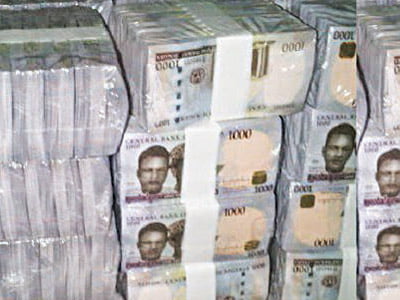Debt is a necessary part of prosperous living. Businesses that intend to grow cannot rely solely on the funds of owners. Joint stock businesses start with the idea of few but expand on the funds of shareholders who are in multiples of the original concept developers. The shareholders who lend their funds to the business become part of the owners of the business by virtue of their contributions which is a debt to the business. Of course, needs of individuals, corporate bodies or governments are naturally always greater than resources to meet them and the need to borrow to fulfil part of the needs becomes imperative. Fortunately, at different times, some people have surplus funds that they save for the rainy day or for the additional incomes they can earn through interest rates on such savings, thus making funds available for borrowers.
Naturally, banks make their profits through efficient financial intermediation, particularly through provision of loans and advances. It is therefore not surprising that the banks can go to any length to mobilise saving whose interest rate is always far lower than lending rates. In developing countries like Nigeria where the market is highly inefficient and there is always a scarcity of loanable funds, the gap between saving and lending is usually very wide. The borrowers are more concerned about availability of funds rather than their costs and the banks are therefore able to rake in massive profits even when other sectors of the economy are declaring losses.
It was first noted long ago in my fairly long stay abroad that banks did approach individuals with large savings to come forward to borrow money promising low interest payment as an incentive. But that approach is now a common phenomenon in Nigeria. The banks can employ personnel directly, who go out to solicit for savings from individuals or corporate organisations and on the other side of the coin they look for corporate borrowers. The banks can also employ firms with the required expertise to do the same business for a fee. This is a common modus operandi in international financial debt market. It is a major business of those so-called big financial institutions that engage in financial rating of countries. Loans from international financial institutions like the World Bank and African Development Bank are, by their nature, excluded from this arrangement.
Mobilising funds from individuals does not involve financial incentive beyond negotiating higher interest rates than normal for such funds but whoever assists in mobilisation of money from a corporate organisation is compensated with at least one percent of the interest rate to be paid on the amount mobilised. That is, if the bank pays 10 per cent interest rate, the negotiator gets one per cent while the organisation supplying the funds gets nine per cent. It is a legal fee for assisting to mobilise the funds. When the negotiator (in the corporate organisation or a country) gets one per cent of a big sum, particularly in foreign currency, the motivation to mobilise more funds and get more compensations becomes captivating. So, they are hooked. By the same token, whoever (government officials or company) negotiates repayment successfully also gets compensated for the effort. This is scam one – the motivation to negotiate more loans for compensations. The banks even encourage and facilitate the opening of foreign currency account for the foreign negotiator not only to complete the incentive (owning a foreign account promotes pride) but also to make sure you spend the money in their country for its multiplier effects on the economy and encourage future visits.
The next level of scam is that many developing countries, particularly African countries, have fallen into debt trap because of the first scam. They are always short of funds and they have ambitious development programmes which could make them catch up with the developed economies or at least move them upward. Most of their development programmes are developed by personnel from those economies who know little or nothing about the basic needs of the people but fashion development in the image of their countries. When SAP was introduced to African countries in the early 1980s, the Economic Commission for Africa, Addis Ababa, Ethiopia under Prof Adebayo Adedeji came up with African Alterative Framework for Structural Adjustment Programme which challenged the World Bank/IMF programme and based on the understanding of the structure of African economies. The African leaders (for want of portage from World Bank) ignored AAF-SAP and embraced SAP, with dire economic quagmire within a decade.
The second scam, which is more important and deleterious, is that a large proportion of the borrowed money from abroad never gets to the destination. The funds are used for logistics (including travels to negotiate and obtain the funds), to purchase machinery and equipment that are produced abroad, to pay technical experts that will follow the equipment down for installation and technical advice, and of course, payment to foreign transporters who bring the machinery and equipment to the destination country. Sometimes, the so-called imported machinery and equipment are not the latest technology but those on their way out of fashion. This could be done deliberately by the sellers with the connivance of the importer. This reminds one of the Leyland bus armada where second or third hand buses were imported into Nigeria by politicians of the Second Republic or the toxic refined petrol that was imported in the late 1990s. Summarily, the borrowed money is expended in the lenders’ countries.
Wherein then lies the benefits derived from external debt that Nigerian government would go borrowing while building up external reserves, whose income, if invested, can never meet up with the high debt servicing. Almost 20 per cent of the country’s annual budget is devoted to servicing the principal of the present external debt. What is the motivation for accumulating debt when they can now afford to use the excess of oil proceeds that is over and above the budget approved base line? The government should not allow international experts who sell the idea that we have a bright future and can borrow for that future. They are into making their money and cannot be blamed for it. Not even when the World Bank and other international agencies have and are warning us on the worrisome state of our external debt
The foreign currencies that we earn from oil are kept abroad, not with our Central Bank. It is the same foreign currencies that are lent to us. Let us avoid Scam One, even if the second scam is inevitable for now and until the steel industry comes alive, the petrochemical industry is energised, the agricultural sector modernised to prevent food shortage and meet industrial demands, and the whole economy becomes diversified, including internationalised service sector (banking, insurance and transport).





